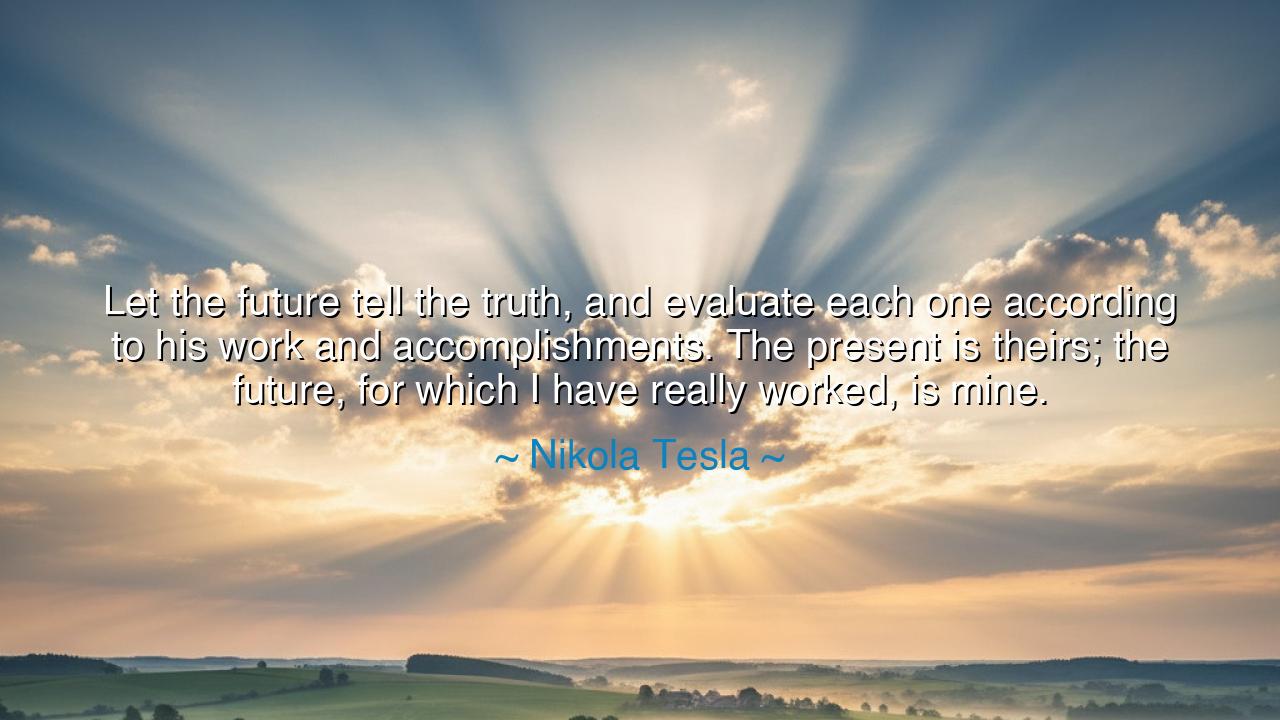
Let the future tell the truth, and evaluate each one according to
Let the future tell the truth, and evaluate each one according to his work and accomplishments. The present is theirs; the future, for which I have really worked, is mine.






Nikola Tesla’s words, "Let the future tell the truth, and evaluate each one according to his work and accomplishments. The present is theirs; the future, for which I have really worked, is mine," reveal the deep essence of vision, innovation, and the sacrifice inherent in creating something that will only be fully appreciated by future generations. Tesla's statement is an assertion that the true measure of one's contribution to humanity is not always recognized in the present moment. He understood that the work and ideas that will shape the world often remain unappreciated until the future can see them for what they truly are. Tesla’s genius lay in his ability to look beyond the present, to invest in ideas that were not yet understood or embraced, and to work relentlessly for a future that he could not yet witness. His was a vision that transcended the immediate.
In the ancient world, this idea of working for a future greater than oneself was no stranger. Alexander the Great, in his ambitious conquests, sought to unite the known world under one banner. Though his empire fell apart shortly after his death, Alexander’s true accomplishment was in the influence he had on future generations, spreading Hellenistic culture far beyond the borders of Greece. His legacy—a future of intellectual flourishing and cultural exchange—was the work of a man whose vision extended far beyond his time. Like Tesla, Alexander understood that history would judge his work long after the present, and that his accomplishments would only be fully realized in the generations that followed.
In a similar way, the philosopher Socrates did not see the fruits of his labor during his lifetime. His teachings, which questioned the very foundation of Athenian society, were not widely appreciated in his time. He was sentenced to death, but his ideas were carried forward by his students, particularly Plato. Socrates’ work found its true recognition in the future, much as Tesla’s inventions did. In both cases, the truth of their contributions was not clear to their contemporaries, but history—and the future—would vindicate their greatness. Their accomplishments, though misunderstood at the time, would later shape the course of philosophy, science, and human thought.
Tesla’s quote speaks to the unseen sacrifice of visionaries and creators—those who, like Leonardo da Vinci, Einstein, or Gandhi, often struggle in the present without immediate recognition. Gandhi, for instance, lived much of his life in relative obscurity and struggled against overwhelming opposition from both his government and his fellow countrymen. It was only after his death that India and the world truly understood the magnitude of his nonviolent revolution and his role in shaping the course of history. Like Tesla, Gandhi’s accomplishments were not immediately recognized, yet the impact he had on the future was profound. His life reminds us that true work—the kind that shapes the world for generations—often requires patience and a willingness to face doubt and rejection in the present.
Tesla’s statement also highlights the tension between the present and the future. The present is immediate, filled with its own struggles, distractions, and satisfactions, but the future holds the potential for clarity, recognition, and a deeper understanding of the work done in the present. This duality is central to the human experience: do we live for today, seeking immediate gratification, or do we work for tomorrow, knowing that our sacrifices may not be fully understood in our lifetime? Tesla chose the latter. He spent his days tirelessly working on ideas that would change the world, knowing that his true legacy would only be fully realized in the future.
The lesson in Tesla’s words is one of visionary perseverance. The future is not something we can always control, but it is shaped by the work and the actions we take today. We must not be discouraged by the lack of immediate recognition or reward, for the impact of our actions may only be visible to others in the future. Just as Socrates, Tesla, and Gandhi had to endure periods of misunderstanding, so too must we have the strength and conviction to continue our work with the belief that it will matter in the future.
So, in our own lives, let us be guided by the knowledge that legacy is often built in the shadows of time. Let us not be distracted by the praise or criticism of the present, but rather remain focused on the values and goals that will have lasting significance. Whether we are creating art, innovating, or fighting for justice, let us recognize that our true work will not always be seen by our contemporaries. Like Tesla, let us trust the future to recognize our contributions, and let it be the truth of our accomplishments that ultimately speaks to the power of our efforts. In shaping the future, we must focus on the work today—knowing that what we build now will carry the weight of the future with it.






AAdministratorAdministrator
Welcome, honored guests. Please leave a comment, we will respond soon